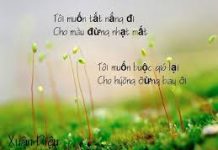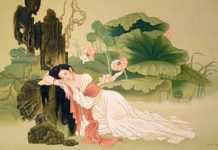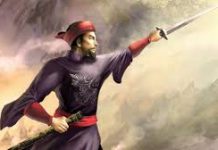Đề ôn thi vào lớp 10 Chuyên ngoại ngữ (Có đáp án)
Mọi ý kiến đóng góp xin gửi vào hòm thư: [email protected]
Tổng hợp các đề cương đại học hiện có của Đại Học Hàng Hải: Đề Cương VIMARU
Kéo xuống để Tải ngay đề cương bản PDF đầy đủ: Sau “mục lục” và “bản xem trước”
(Nếu là đề cương nhiều công thức nên mọi người nên tải về để xem tránh mất công thức)
Đề cương liên quan:Bộ 20 đề ôn thi vào lớp 10 môn Tiếng Anh
Mục Lục
- Đề ôn thi vào lớp 10 Chuyên ngoại ngữ (Có đáp án)
- ÔN VÀO 10
- I. Choose the word in each group that has the underlined part pronounced differently from the rest.
- II. Choose a word in each group that has different stress pattern.
- III. Decide the best option A, B, C, or D for each gap to complete the following sentences.
- IV. Choose the correct option A, B, C, or D for each of the gaps to complete the following passage.
- V. Read the following two passages and choose the correct answer for each question.
- VI. Finish the following conversation by filling a suitable preposition in each numbered gap.
- VII. Rewrite the following sentences, using the words given in brackets. Keep the new sentences as close in meaning to the original ones as possible.
- VIII. Write a paragraph about the origin of basketball, basing on the following cues.
- ANSWER KEYS
Tải ngay đề cương bản PDF tại đây: Đề ôn thi vào lớp 10 Chuyên ngoại ngữ (Có đáp án)
Đề ôn thi vào lớp 10 Chuyên ngoại ngữ (Có đáp án)
ÔN VÀO 10
I. Choose the word in each group that has the underlined part pronounced differently from the rest.
- campus
- congratulate
- gathering
- designed
- exchange
- relax B. profit B. clothes B. published fetch
- ancient C. compose C. athletics C. covered chimney
- fascimile D. decorate D. bathe D. sprayed
- champagne
II. Choose a word in each group that has different stress pattern. |
|
|||
| 6. | A. psychedelic | B. inspiration | C. interactive | D. encouragement |
| 7. | A. scenery | B. encourage | C. embroider | D. experience |
| 8. | A. puppet | B. freedom | C. describe | D. message |
| 9. | A. extensive | B. opinion | C. official | D. optional |
| 10. | A. compulsory | B. convenient | C. correspond | D. communicate |
III. Decide the best option A, B, C, or D for each gap to complete the following sentences.
- In towns please drive slowly! You …… drive faster than 50 kph.
| A. don’t have to | B. mustn’t | C. mayn’t | D. needn’t |
| 12. We can’t use the car now because it …… . | |||
| A. is mended | B. hasn’t mended | C. is being mended | D. will be mended |
| 13. They were arrested …… smuggling drug into the country. | |||
| A. of | B. by | C. for | D. about |
| 14. Who do you think I ran …… in the library this morning? | |||
| A. down | B. over | C. in | D. into |
- …… behalf of the committee, I’d like to thank you for your generous donation.
| A. In | B. For | C. On | D. To | |
| 16. …… the rain, the football match went ahead. | ||||
| A. Owing to | B. Despite | C. However | D. In spite | |
| 17. …… he leaves or I leave! | ||||
| A. Either | B. Neither | C. Only | D. Unless | |
| 18. | Why don’t you buy bananas when they are much …… than apples? | |||
| A. less expensive | B. not expensive | C. as expensive | D. lesser expensive | |
| 19. | Mr. Brown is the landlord …… we rent the house. | |||
| A. who | B. whom | C. from whom | D. of whom | |
| 20. | Let’s go for a walk, …… ? | |||
| A. do we | B. shall we | C. don’t we | D. let not we | |
| 21. | By the age of twenty-five he had …… his wish of becoming a pianist. | |||
| A. reached | B. achieved | C. obtained | D. had | |
| 22. | A large shop that sells all kinds of goods is called a …… . | |||
| A. warehouse | B. storeroom | C. department | D. department store | |
| 23. | When you’re on holiday you might buy a …… to take home with you. | |||
| A. souvenir | B. message | C. memory | D. remembrance | |
| 24. | I am very sorry. I’ve …… your book at home again. I’ll bring it again tomorrow. | |||
| A. forgotten | B. stored | C. left | D. thrown | |
| 25. | We’d better …… really early. It’s a very long journey. | |||
| A. set up | B. set off | C. set down | D. set on | |
| 26. | I’ve got a very high opinion …… your brother. | |||
| A. on | B. to | C. for | D. of | |
| 27. | We don’t sell foreign newspapers because there is no …… for them. | |||
| A. request | B. claim | C. requirement | D. demand | |
| 28. …… I know, there are no problems with the class. | ||||
| A. As far as | B. So much as | C. Much more than | D. Except that | |
| 29. | The little girl wouldn’t go to the seaside …… her father went too. | |||
| A. except | B. but | C. also | D. unless | |
| 30. | Having …… the table, Mrs Robert called the family for dinner. | |||
| A. laid | B. spread | C. ordered | D. completed | |
IV. Choose the correct option A, B, C, or D for each of the gaps to complete the following passage.
| A FAMOUS EXPLORER | |||||||||
| Captain James Cook is remembered today for being one of Britain’s most famous | |||||||||
| explorers of the 18th century. Cook was (31) …… | most other explorers of the same period as | ||||||||
| he did not come from a wealthy family and had to work hard to (32) …… | his position in life. | ||||||||
| He was lucky to be (33) …… | by his father’s employer, who saw that he was a bright boy and | ||||||||
| paid for him to attend the village school. At sixteen, he started (34) …… | in a shop in a fishing | ||||||||
| village (35) …… | on the coast and this was a turning (36) …… | in his life. He developed an | |||||||
| interest in the sea and eventually joined the Royal Navy (37) …… | to see more of the world. | ||||||||
| Cook was (38) | …… | by sailing, astronomy and the production of maps, and quickly | |||||||
| became an expert (39) | …… | these subjects. He was also one of the first people to (40) …… | |||||||
| that scurvy, an illness often suffered by sailors, could be prevented by careful (41) …… | to | ||||||||
| diet. It was during his (42) | …… to the Pacific Ocean that Cook made his historic landing in | ||||||||
| Australia and the (43) …… | discovery that New Zealand was two (44) …… | islands. He became | |||||||
| national hero and still (45) | …… one today. | ||||||||
| 31. | A different | B distinct | C contrary | D unlike | |||||
| 32. | A manage | B succeed | C achieve | D fulfill | |||||
| 33. | A. remarked | B viewed | C glanced | D noticed | |||||
| 34. | A trade | B work | C career | D job | |||||
| 35. | A held | B placed | C positioned | D situated | |||||
| 36. | A moment | B instant | C point | D mark | |||||
| 37. | A in view | B in order | C as | D due | |||||
| 38. | A keen | B eager | C fascinated | D enthusiastic | |||||
| 39. | A from | B over | C in | D for | |||||
| 40. | A regard | B estimate | C catch | D realize | |||||
| 41. | A attention | B organization | C observation | D treatment | |||||
| 42. | A travel | B voyage | C excursion | D tour | |||||
| 43. | A serious | B superior | C major | D leading | |||||
| 44. | A shared | B particular | C common | D separate | |||||
| 45. | A keeps | B stands | C maintains | D remains | |||||
V. Read the following two passages and choose the correct answer for each question.
Various types of fog are essentially clouds that form at the earth’s surface, produced by temperature differences and moisture in the air. As warm, moisture-laden air cools, its relative humidity (the amount of moisture that air can contain, which depends on the temperature) increases. Warm air can hold more water vapor than cold air. So if the air is cooled sufficiently it will reach saturation, or the dew point, at which point the moisture begins to condense out of the air and form water droplets, creating fog.
- What is the author’s main purpose in this passage?
- To describe various types of fog
- To explain how fog is formed
- To define relative humidity
- To compare the effects of warm air and cold air
- This passage would most likely be written by …… .
- an archeologist B. a biologist
- a meteorologist D. a psychologist
- The word in bold “sufficiently” as used in the passage is closest in meaning to …… .
- supposedly B. efficiently C. readily D. satisfactorily
- The tone of this passage could best described as …… .
- humorous B. argumentative C. objective D. persuasive
- It can be concluded from the passage that …… .
- foggy days are caused by cold nights
- fog is likely to form in desert areas
- hot humid days are usually followed by cold, foggy nights
- fog could form on a cold evening after a warm day
A healthful lifestyle leads to a longer, happier, healthier life. Staying healthy means eating a well-balanced diet, getting regular exercise, and avoiding things that are bad for the body and mind.
Nutrition plays a key role in maintaining good health and preventing many diseases. In spite of all the information available about diets, scientists still believe that good nutrition can be simple. There are several basic rules to follow. Keep fat intake low. Eat foods high in carbo-hydrates, which are the starches in grains, legumes (beans and peas), vegetables, and some fruits. Avoid too much sugar. Limit salt. Eat lots of fruits and vegetables, which are high in vitamins.
A healthful lifestyle is an active lifestyle. Lack of proper physical exercise can cause tiredness, irritability, and poor general health. Physical fitness requires both aerobic exercise, such as running, bicycle riding, and swimming, and muscle-strengthening exercises, such as weight-lifting.
Finally, good health is acquired by saying no to bad habits such as smoking, drinking, and overeating and by avoiding situations that are constantly stressful. People can take their lives and happiness into their own hands. Maintaining a healthy lifestyle is the first step.
- What is the main idea of the passage? A. How to keep an active lifestyle
- How to lead a healthy life C. The importance of nutrition
- The importance of physical exercise
- Three kinds of food that you should avoiding having too much of are …… .
- fat, foods high in carbo-hydrates, and legumes B. fat, salt, and vegetables
- starches, sugar, and salt D. fat, sugar, and salt
- …… are not good for your health.
- Smoking, drinking, excessive eating, and dieting B. Drinking and excessive eating
- Smoking, drinking, excessive eating, and stressful situations
- Smoking, drinking, excessive eating, dieting, and stressful situations
- What does the word “nutrition” in the first paragraph mean?
- The food we eat B. Eating C. Good health D. Dieting “
- Continuously B. Continually C. Terribly D. Eventually
VI. Finish the following conversation by filling a suitable preposition in each numbered gap.
Sammy: Hello, Mr. Bright. You’ve been gone a long time. Where have you been?
Phil: Asia. I’ve been (56) …… Hong Kong, Singapore, Tokyo … all over.
Sammy: You sure do travel a lot.
Phil: Too much. I’m tired (57) …… travelling now an d just want to stay home.
Sammy: Why do you want to do that? It’s not interesting (58) …… here.
Phil: Sammy, I’ve been everywhere and I’ve seen eve rything. Now I just want to settle
down (59) …… a while.
Sammy: But your life is so exciting.
Phil: Exciting? I spend all my time going (60) …… airports, waiting (61) …… my
luggage, looking (62) …… a taxi, chec king (63) …… a hotel … It’s not exciting at
all.
Sammy: Well it sure sounds exciting (64) …… me. I haven’t been anywhere. I’ve spent my
whole life right here in this small city.
Phil: Well, why don’t you go somewhere (65) …… you r next vacation?
Sammy: Me? Travel? Oh, I couldn’t do that. You have to get reservations and pack and … I might lose my passport and … Oh, no … not me.
VII. Rewrite the following sentences, using the words given in brackets. Keep the new sentences as close in meaning to the original ones as possible.
| 66. | I only recognized him when he took off his hat. | NOT UNTIL | |
| 67. | How far is it from Ha Noi to Sapa? | DISTANCE | |
| 68. | You needn’t hurry. There’s still much time left . | NECESSARY | |
| 69. | You will catch a cold if you don’t keep your feet dry. | UNLESS | |
| 70. | On arrival at the shop, the goods are inspected carefully. | WHEN | |
| 71. | The accident happened because the train driver ignored the warning light. | IF | |
| 72. | “You should take more exercise,” the doctor sai d, “if you want to lose weight.” | ADVISED | |
| 73. | “Could you guard my handbag while I go to the t oilet?” | EYE | |
| 74. | The thief has broken into his house three times recently. | HAD |
| 75. | He is finding it easier to work on night shift. | GETTING |
VIII. Write a paragraph about the origin of basketball, basing on the following cues.
- Basketball/ invent/ 1891/ physical education instructor/ Springfield/ name/ James Naismith
- Because/ terrible weather/ winter/ physical education students/ indoors/ rather/ outdoors
- not like/ idea/ boring/ repetitive exercise/ prefer/ excitement/ challenge/ game
- Naismith/ figure out/ team sport/ can play/ indoors/ involve/ lot/ running
- new game/ not allow/ tackling/ physical contact/ American-style football
- The End —–
ANSWER KEYS
| 1. C | 2. B | 3. C | 4. B | 5. D |
| 6. D | 7. A | 8. C | 9. D | 10. C |
| 11. B | 12. C | 13. C | 14. D | 15. C |
| 16. B | 17. A | 18. A | 19. C | 20. B |
| 21. B | 22. D | 23. A | 24. C | 25. B |
| 26. D | 27. D | 28. A | 29. D | 30. A |
| 31. D | 32. C | 33. D | 34. B | 35. D |
| 36. C | 37. B | 38. C | 39. C | 40. D |
| 41. A | 42. B | 43. C | 44. D | 45. D |
| 46. B | 47. C | 48. D | 49. C | 50. C |
| 51. B | 52. D | 53. C | 54. A | 55. A |
| 56. to | 57. of | 58. around | 59. for | 60. to |
| 61. for | 62. for | 63. into | 64. to | 65. on |
- Not until he took off his hat did/ could I recognize him.
- What is the distance from Ha Noi to Sapa?
- It is not necessary (for you) to hurry. There is ……
- Unless you keep your feet dry, you will catch a cold.
- When the goods arrive at the shop, they are inspected carefully.
- If the train driver hadn’t ignored/ had taken notice of/ had paid attention to the warning light, the accident wouldn’t have happened.
- The doctor advised me/ him … to take more exercise if I/ he … wanted to lose weight.
- “Could you keep an eye on my handbag while I go to the toilet?”
- He has had his house broken into three times recently.
- He is getting used to working on night shift.
76 – 80:
Basketball was invented in 1891 by a physical education instructor in Springfield, by the name of/ whose name was James Naismith. Because of the terrible weather in winter, his physical education students were/ had lessons indoors rather than outdoors. They did not like the idea of boring and repetitive exercise, and preferred the excitement and challenge of a game. Naismith figured out a team sport that could be played indoors that involved a lot of running. The new game did not allow tackling and physical contact of American-style football.











